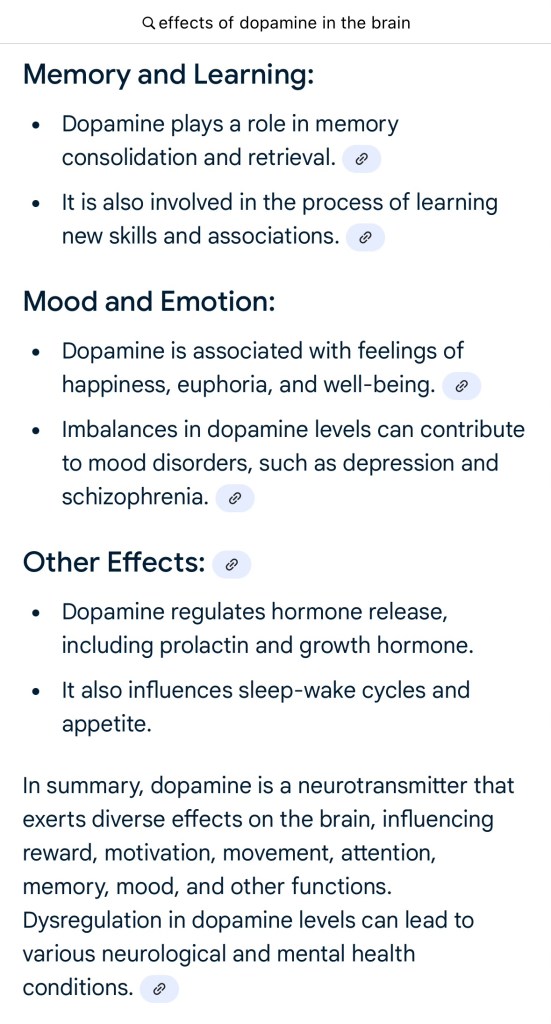This link is for the technically-minded, but I show some highlights below.
From Chris 😃 my good friend and fellow Yeshiva graduate with a DHL. She also “happens to be” a brilliant neuroscientist.

LTP = long-term potentiation
“Novelty,” new learning, induces dopamine release in the hippocampus, triggering memory consolidation to boost memory persistence. We can actually get a “high” from new learning, AND those really emotional findings/learning tend to stick with us (LTP) AND when we get a “high” (like endorphin release with runners) we can actually have a tendency to get addicted…


- So… I would like to encourage you to think about this new-found knowledge (likely, though some of you may have already been aware) in two directions, and to mentally link it to the discussion in the past two blogs re: emotions.
- The first direction to consider is how it relates to a discussion in Blog 94 about a Jewish concept known as “lashon HaRa” or evil tongue. Below is an excerpt.

Blog 94: “What is our lesson for today? How many are being publicly crucified in either the public media or social media? The consequence of public crucifixion is “death” for the one crucifying (recall we have spoken recently, death may be physical death or may be a death of one’s spirit, or even a death of one’s own reputation). If someone sins against us, we are to “tell him his fault between you and him alone.” John might have gained Herod as a brother and changed history. Instead, he “struck him with an iron implement.”
The very last resort should be going public. And social media is every bit as public as the newspaper or the radio or television news.
[A personal interpretation of being as innocent as doves, which the reader can feel free to accept or reject, is that indulging in what others share that should have been handled privately is equally guilty. Look up the discussion here, and its Biblical references. Leviticus 19:16; Psalms 34:13; Proverbs 11:13, 20:19; Exodus 23:1, 23:7. https://en.wikipedia.org/wiki/Lashon_hara
As you read the Wikipedia article, this definition of the term lashon hara: “derogatory speech about a person, which emotionally or financially damages them or lowers them in the estimation of others. Lashon hara differs from defamation in that lashon hara can consist of truthful speech as well as lies.
Please let that sink in: it “can consist of truthful speech as well as lies.”
Public crucifixion of another person brings consequences back upon the one crucifying (even if it is true). The Teacher has taught the correct way to deal with confrontations: Matthew 18:15-17. This reflects the Barzillai character. This is turning the other cheek. This is wise yet innocent. And it does take some iron will/strength to restrain your feelings, your hurt, your frustration with others. Barzillai refuses repayment for his kindnesses and passes along to another. “He must increase; I must decrease.” We have the benefit of seeing both sides of John the Baptist/Baptizer. We can be all three, wise, innocent, and strong. Our strength is best shown in restraint, turning the other cheek.”
You can see how it ties in to our recent discussions. The step further I would like for you to take, with the new knowledge of the “dopamine high,” is how social media discussions ((even if the underlying facts are true)) can turn into a “feeding frenzy.” It is addiction-type behavior.
The other direction I would like to ask you to ponder has two sub-topics. The first is, the approach the Serpent used in the Garden with Havva/Eve. Remember this is not the tree of good and evil but the tree of the “knowledge” of good and evil. When we learn that something is “forbidden fruit,” our desire for the “high” that the fruit will bring is SO difficult to resist (back to our את cognate permutation definition).
⦁ Genesis 3:6 NKJV
6 So when the woman saw that the tree was good for food, that it was pleasant to the eyes, and a tree desirable to make one wise, she took of its fruit and ate. She also gave to her husband with her, and he ate.

- I’m trying here to make sure your eyes are open to what is really written. See, please, that Havva/Eve has already (partly based upon her own internal drives and partly based upon the words of the wily serpent) made three judgments about “good” even before she takes the fruit. Next, there are actions based upon her emotional judgments, taking, eating, and sharing/passing along. This is truly addictive behavior. When is the time easiest to resist? Before the taking, not to mention the eating. It must be at the point of “judging.” Again, back to Matthew 7:1-4. And we love to get others hooked also, so we don’t feel so bad about ourselves…
The other subtopic relates to the study of Scripture itself, and the topic of “whoever sees the face of God will surely die.” Of course we have discussed before: Exodus 33:20 ESV
20 But,” he said, “you cannot see my face, for man shall not see me and live.”
Another reference has to do with Samson’s parents: Judges 13:22 NKJV
22 And Manoah said to his wife, “We shall surely die, because we have seen God!”
Fire Hose

I remember the first time thinking about doing these Hebrew studies as being similar to trying to take sips from a fire hose. It was actually when I was living in my little travel trailer, shortly after the quarantine period for COVID, summer of 2020. And you can see I discussed it before, in the Spring of 2023.
Not long ago I mentioned that “to die” in Scripture does not necessarily mean a physical death. I used the example of Adam and Havva/Eve in the Garden. As the LORD יהוה told them that on the day that they ate of the tree they would surely die, but there was not a physical death, יהוה was clearly speaking of another kind of death, a death of the soul. We go back to this concept:

Look at the components in the Soul. Seeing the “face/countenance” of God has a huge impact upon those components. To me, it is the idea of “fearing God,” the amazing awe and wonder that we feel when we look at the sky at night with no light pollution, or, as with my daughter’s recent visit to the Grand Canyon. We feel so very small… awe and wonder.

And Scripture begins to show us the face/countenance of God. I shared before that Scripture seems to be infinitely complex, as the LORD is infinitely complex. No, we will never fully comprehend the LORD. And no, we will never fully comprehend Scripture. But I got a glimpse in the Summer of 2020 that the firehose was so powerful, as I tried to take sips, that it would totally wash me away if I did not take breaks from its study. I go back to the thought of learning novel information and a “high” and addiction. It is SO easy for me to spend every minute on my studies because I get such reward from them. But I also know that I MUST push away at times. I MUST treat it like a highly addictive substance like sugar. I am on a path which I believe is my life’s purpose, but to be 100% immersed would be a “death” of sorts. And God knows us, what we are made of, our strengths and weaknesses (see Psalm 139). He wants us to know and love him, but he knows that we cannot handle the full dose. There must be cycles, the ebb and flow, the growth and the cutting back.
I encourage you to Google the recent events in Israel (interfering with Israeli politics is neither an interest nor an intent of mine). There is great controversy over the Haredi/Ultra-Orthodox Jews being exempt from military service. These people spend all their time immersed in Torah. I picture the scene in Star Wars where Rey allows herself to be swallowed into the pit and Luke comments that she didn’t even try to fight it. Even in this, we must keep in mind the idea of את, (restrain/express, physical and emotional). My personal Theology (accept or reject) is that Yeshua/Jesus is a means by which we can begin to know God with some finite limitations, the limitations of our flesh, as an interim step along the path. And remember בשׂר is both flesh and tidings.
Blessings, PG
Ⓒ Copyright Philip E. Gates; LogAndSpeck.com September 2025